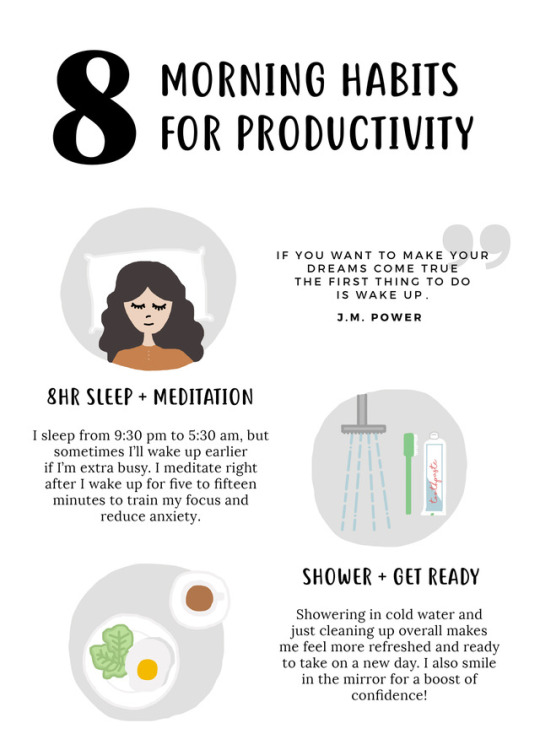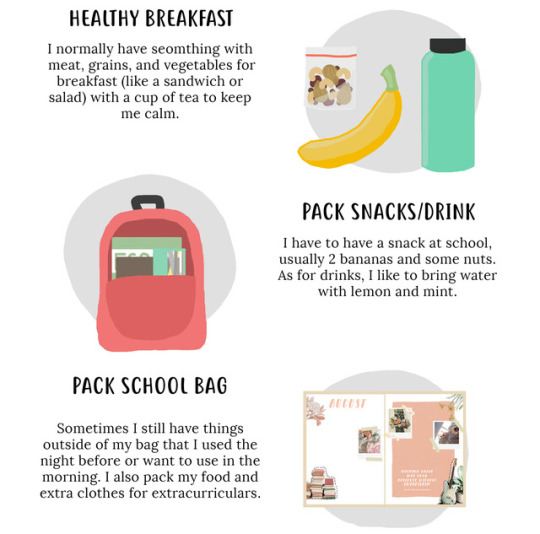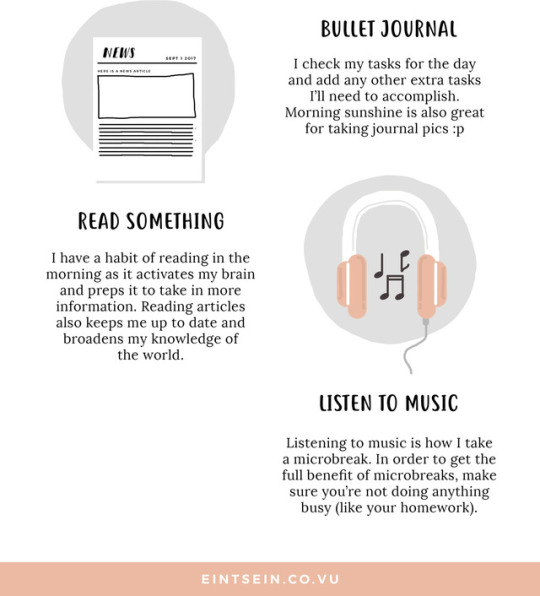I'm a quirky guy sharing neat stuff and ideas. My goal with tumbler is to bring share tons of neat stuff for students and anyone who wants to become more productive. I also love music, especially acoustic arrangements.
Don't wanna be here? Send us removal request.
Video
youtube
This has to be one of the greatest timelapses that I’ve seen to date. Straight up awesome. The music change around half way is also kinda fitting, but doesn’t have lasting appeal if I’m being honest.
1 note
·
View note
Photo
Throw exercise in there and 👌👌👌



Hey guys, so I’ve seen some posts around about daily routines so I thought I’d share my own. I consider myself to be great at being productive even early in the morning, and here’s how I achieve that. Hope this is helpful, and feel free to ask me questions if you have any!
37K notes
·
View notes
Photo

Made by me. The composition behind this is very interesting.
0 notes
Photo






Following my stationery tour and what’s in my pencil case posts, I thought I’d finish the back to school series with a post about what I’ll be taking to college with me for my second year of a-levels!
Left to right and top to bottom:
My bag is from M&S (in the men’s section) - it’s just a plain black rucksack
My lunchbox is kept in the first zipped compartment (with my water bottle)
My earbuds and keys (not pictured) are kept in the first open pocket
My calculator, pencil case and bullet journal are kept in the first zipped compartment
My tissues, lip balm, hand sanitiser and purse are kept in the small zipped pocket in the first zipped compartment (cannot be seen from the picture)
In the second zipped compartment I keep my books and paper
I hope you enjoyed this insight into my college bag and I hope you have a great start to the new school year!
102 notes
·
View notes
Photo
Informational, and super helpful! I have unintentionally already been using many of these tips. #Evernoted

Staying organised is a really personal thing as everybody has their own preferences! In this post, I’ll be sharing some tips to help you find your organisational system and I’ll be showing mine!
How I stay organised:
I use one cardboard folder to hold all my loose leaf paper and worksheets for each subject. They’re thin, light, sturdy and keep everything together!
Once we’ve finished a topic in class and I’ve made my neat notes, I transfer all the content to the ringbinder folders I keep at home - one for each subject.
I separate the neat and rough notes so that I can revise for future tests easily in the future.
Every Sunday I’ll do a big tidy of my desk area and at the end of every day, I’ll tidy up for five minutes so I have a tidy desk to come back to in the morning.
General tips:
Ringbinder folders are often too bulky to carry to college - if people do bring them, they’ll generally just bring one and keep everything in there.
Separate rough and neat notes for easy revision in the future
Every Sunday, empty your school bag and file everything away into it’s correct folder.
Try and stay on top of filing throughout the week as well by doing five minutes at the end of every working day
Throw away scraps of paper and old pens
Keep your desk clear of clutter and stack books into piles so they don’t take up too much room.
Don’t stuff random papers into your bag - they’ll get crumpled really easily. Instead, I use a plastic folder to hold all random pieces of paper. This is really useful when you’ve got things like a part-time job, university application and other things going on that need to be looked after.
A tidy desk is a tidy mind and it’s so much easier to work in!
Packing your bag the night before makes it a lot easier to get up in the morning as I feel like I can simply walk out the door with no fuss
Overall, staying organised is just keeping on top of things and trying to keep your environment tidy and filing things away.
I hope these tips have helped you! I understand that everyone is different with how they like to organise their lives, but I felt like a little insight into what I do could be useful for some of you! Let me know how you like to organise your papers for college!
714 notes
·
View notes
Photo

I began to study hard about two years ago, when I started my final GCSE year and when I started my studyblr. Since then, I’ve discovered how I like to write my notes and the organisational techniques that work for me. However I’ve always struggled with finding a strategy of how to actually learn information for a test in an effective way. Hopefully by the end of this post you’ll have a few more ideas you can implement so you can see how you will learn over this next academic year!
Ask questions
This is the best way to understand a topic - and you need to understand it before you attempt writing notes on it and then studying it. I know that lots of people don’t like to ask questions during class, so stay behind for a few minutes at the end or email your questions to your teacher. Sometimes them just telling you 1:1 what they said in class can make more sense and once a topic clicks in your head and you understand it, you’ll be able to study it so much more effectively!
Write notes that work for you
This is the first step to understanding a concept! Though it may take a few attempts before you find a way of making notes that works for you (check out my post all about writing notes here), it will help tons in the long run as you can then re-read these multiple times and have them as a clear resource where everything you need to learn is is one place.
Mindmaps
Mindmaps are really useful for visual learners; I made mindmaps and read them so much I memorised them so that in exams you can simply pull up your mindmap to the front of your mind and read from it! Even if that’s not possible for you, this is a great way to actively study as you can try to write out your mindmap without looking at your notes, see how far you get relying on your memory and then you’ll know what you struggle with and need to learn!
Brain dump
Similar to mindmaps above, but done on a broader level, testing yourself is the best way to actively learn a subject! This can be done by a brain dump; once I finish making topic notes, I then make a mind map with only a few prompt words around it. Whenever I come to revise, I get a plain piece of paper, and my prompt words to write down everything I can remember. This is my brain dump of the topic. I then go through my brain dump with my proper notes and use a coloured pen to correct what I wrote down wrong and annotate it with anything I missed out. The act of writing everything down you know, everything you don’t know in a different colour and reading through your notes really gets the information in your head.
Have others test you verbally
A quicker way to test yourself is to give your notes to a family member or a friend and have them test you on the content. This works in the same way as the brain dump but is quicker as you’re talking the answers, not writing them down. A way you can test yourself when you’re alone is to explain a process or topic to something/someone around you; I use my dogs, a cuddly toy or even just a lamp and explain the concept as clearly as I can to them.
Mind palace
Lots of people use a ‘mind palace’ technique to memorise a process or list of things. This is when you choose an object or room that you know extremely well and assign different parts of it to a step of the process or item on the list to. For example, I could memorise the factors affecting short term aggregate supply and assign them to my alarm clock; so labour costs is the face of the clock, price of raw materials is the ‘hour’ button and levels of tax and subsidies is the ‘minute’ button, etc. I haven’t used this technique myself before as I only discovered it recently, but I fully intend to use it over the next year for my a-levels!
Create acronyms
This is the method that I use for memorising lists and it works similarly to the mind palace technique above. I use these in economics mostly for factors affecting different markets, supply and demand, etc. As well as being extremely useful in the exam itself, they’re great beforehand as they don’t have to make sense and you can have fun creating them and testing yourself on them! So for macroeconomic evaluation points, I use CCCREEMTTT - it sounds a bit like ‘cream tea’ and makes me smile whenever I use it! They are a genuine lifesaver for me!
Use actual tests
After making sure that you know the content using the above methods, using practice papers or textbook questions really is the best way to perfect your exam technique. Mark your own work so you can see the mark scheme and get accustomed to the way in which they mark and what they’re looking for in your answers.
Focus on what you don’t know
It’s easy to summarise all the above points in just a few words; focus on actively studying what you don’t know. It’s all too easy to revise the same first chapter of your textbook each week because you know the content and it makes you feel good to get the answers right, however that isn’t helping your future self as you’re neglecting the topics that you don’t know.
Try and be true to yourself and really question whether you’re studying in the most efficient way possible (’has reading the textbook for half an hour really helped me to understand this?’). Once you get into the habit of actively studying and finding which of the above methods works for you, you’ll find that you know and understand the topic and enjoy testing yourself and finding what you really know.
Thank you for reading and let me know which tip was your favourite or if there are any others that you’d like me to add! Go to my masterposts page here to see individual posts on how to study history, economics, maths and for GCSEs!
1K notes
·
View notes
Audio
(via https://open.spotify.com/track/2NIzwse5N79SLAQKsUagMt) Another great arrangement, by the Kamakahis! This ukelele, guitar arrangement is a joy to listen to.
0 notes
Audio
Added to my study playlist. I really did enjoy this instrumental.
0 notes
Video
I just wonder how his fingers kept going in such conditions!
tumblr
Every action you take can change the future.
14K notes
·
View notes
Video
Wohooo! Talent! And also a lot of effort and practice. I wonder what this piece is called...
tumblr
8 Hands, 1 Piano! Watch more!
343K notes
·
View notes
Text
Duly Noted, very useful info.
How to Study Like a Harvard Student
Taken from Sophia Chua-Rubenfeld, daughter of the Tiger Mother
Preliminary Steps 1. Choose classes that interest you. That way studying doesn’t feel like slave labor. If you don’t want to learn, then I can’t help you. 2. Make some friends. See steps 12, 13, 23, 24. General Principles 3. Study less, but study better. 4. Avoid Autopilot Brain at all costs. 5. Vague is bad. Vague is a waste of your time. 6. Write it down. 7. Suck it up, buckle down, get it done. Plan of Attack Phase I: Class 8. Show up. Everything will make a lot more sense that way, and you will save yourself a lot of time in the long run. 9. Take notes by hand. I don’t know the science behind it, but doing anything by hand is a way of carving it into your memory. Also, if you get bored you will doodle, which is still a thousand times better than ending up on stumbleupon or something. Phase II: Study Time 10. Get out of the library. The sheer fact of being in a library doesn’t fill you with knowledge. Eight hours of Facebooking in the library is still eight hours of Facebooking. Also, people who bring food and blankets to the library and just stay there during finals week start to smell weird. Go home and bathe. You can quiz yourself while you wash your hair. 11. Do a little every day, but don’t let it be your whole day. “This afternoon, I will read a chapter of something and do half a problem set. Then, I will watch an episode of South Park and go to the gym” ALWAYS BEATS “Starting right now, I am going to read as much as I possibly can…oh wow, now it’s midnight, I’m on page five, and my room reeks of ramen and dysfunction.” 12. Give yourself incentive. There’s nothing worse than a gaping abyss of study time. If you know you’re going out in six hours, you’re more likely to get something done. 13. Allow friends to confiscate your phone when they catch you playing Angry Birds. Oh and if you think you need a break, you probably don’t. Phase III: Assignments 14. Stop highlighting. Underlining is supposed to keep you focused, but it’s actually a one-way ticket to Autopilot Brain. You zone out, look down, and suddenly you have five pages of neon green that you don’t remember reading. Write notes in the margins instead. 15. Do all your own work. You get nothing out of copying a problem set. It’s also shady. 16. Read as much as you can. No way around it. Stop trying to cheat with Sparknotes. 17. Be a smart reader, not a robot (lol). Ask yourself: What is the author trying to prove? What is the logical progression of the argument? You can usually answer these questions by reading the introduction and conclusion of every chapter. Then, pick any two examples/anecdotes and commit them to memory (write them down). They will help you reconstruct the author’s argument later on. 18. Don’t read everything, but understand everything that you read. Better to have a deep understanding of a limited amount of material, than to have a vague understanding of an entire course. Once again: Vague is bad. Vague is a waste of your time. 19. Bullet points. For essays, summarizing, everything. Phase IV: Reading Period (Review Week) 20. Once again: do not move into the library. Eat, sleep, and bathe. 21. If you don’t understand it, it will definitely be on the exam. Solution: textbooks; the internet. 22. Do all the practice problems. This one is totally tiger mom. 23. People are often contemptuous of rote learning. Newsflash: even at great intellectual bastions like Harvard, you will be required to memorize formulas, names and dates. To memorize effectively: stop reading your list over and over again. It doesn’t work. Say it out loud, write it down. Remember how you made friends? Have them quiz you, then return the favor. 24. Again with the friends: ask them to listen while you explain a difficult concept to them. This forces you to articulate your understanding. Remember, vague is bad. 25. Go for the big picture. Try to figure out where a specific concept fits into the course as a whole. This will help you tap into Big Themes – every class has Big Themes – which will streamline what you need to know. You can learn a million facts, but until you understand how they fit together, you’re missing the point. Phase V: Exam Day 26. Crush exam. Get A.
238K notes
·
View notes
Link
What an inspiring page. This guy is so full of musical talent, and passion for The Lord.
0 notes
Photo

AUGUST SUBSCRIBER ITEM REVEALED! The August Subscriber Item has been revealed the Lava Warrior Item Set! You only have fourteen days to receive the item set when you subscribe. If you’re already an active subscriber, reload the site and then head to Inventory > Equipment to claim your gear!
Subscribers also receive the ability to buy gems for gold – the longer you subscribe, the more gems you can buy per month! There are other perks as well, such as longer access to uncompressed data and a cute Jackalope pet. Best of all, subscriptions let us keep Habitica running. Thank you very much for your support – it means a lot to us.
9 notes
·
View notes
